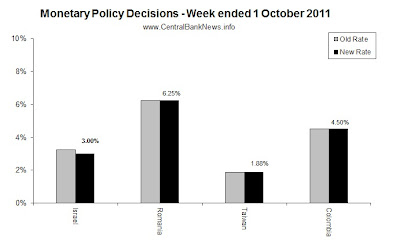The past week in monetary policy was relatively quiet with just 4 central banks announcing interest rate decisions. Israel cut its rate by 25bps to 3.00%, while Romania held at 6.25%, Taiwan held at 1.875%, and Colombia held at 4.50%. Also making news in central banking and monetary policy was the announcement from the central bank of Angola, where it said it would launch a new benchmark interest rate. Elsewhere, Vietnam announced deposit interest rate caps, and Denmark announced a set of emergency bank liquidity provisioning measures.
Following are some of the key quotes from the central banks that announced monetary policy decisions over the past week:
- Bank of Israel (cut rate 25bps to 3.00%): “The decision to reduce the interest rate for October to 3 percent is based mainly on the negative turnaround in the global economy, is consistent with the return of inflation to within the target range of price stability, and is intended to support growth while preserving financial stability.”
- Banca Nationala a Romaniei (held rate at 6.25%): “Disinflation is expected to continue in the period ahead, so that annual inflation rate will near the target. The faster disinflation while keeping the monetary policy rate unchanged and amid a moderate leu exchange rate volatility translate into a tightening of real broad monetary conditions aimed at supporting the convergence of inflation towards the medium-term objectives.”
- Central Bank of the Republic of China [Taiwan] (held rate at 1.875%): “A global slowdown and consumer prices stabilizing led to the decision,”… “Taiwan’s imported inflation will cool as global prices ease in the next three months after peaking in the third quarter.”
- Central Bank of Colombia (held rate at 4.50%): “The international environment has deteriorated in the weeks after the last Board (meeting). Concerns about sovereign debt problems have grown and growth forecasts in the U.S. and Europe in 2011 and 2012 have been revised downwards. In some of the economies of Asia and Latin America, new information points to a moderation in growth. International prices of commodities have fallen but remain at high levels.”
Looking at the central bank calendar, next week there are eight central banks scheduled to announce monetary policy decisions. The big one will be the ECB, with some speculation on a rate cut – but the more likely outcome being further liquidity measures, also, this will be Jean-Claude Trichet’s last meeting before Mario Draghi takes over as ECB president. Attention will also be paid as to whether the Bank of England or Bank of Japan announce further quantitative easing.
- PEN – Peru (Banco Central de Reserva del Peru) expected to hold at 4.25% on the 3rd of Oct
- AUD – Australia (Reserve Bank of Australia) – expected to hold at 4.75% on the 4th of Oct
- PLN – Poland (National Bank of Poland) – expected to hold at 4.50% on the 5th of Oct
- KES – Kenya (Central Bank of Kenya) – expected to on hold at 7.00% the 5th of Oct
- RSD – Serbia (National Bank of Serbia) – expected to hold at 11.25% on the 5th of Oct
- GBP – United Kingdom (Bank of England) – expected to hold at 0.50% on the 6th of Oct
- EUR – EU (European Central Bank) – expected to hold at 1.50% on the 6th of Oct
- JPY – Japan (Bank of Japan) – expected to hold at 0.10% on the 7th of Oct
